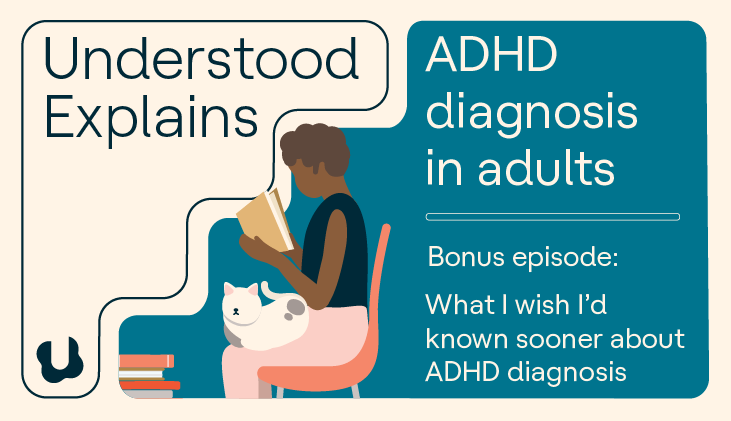Stay in the know
All our latest podcasts delivered right to your inbox.
This bonus episode of Understood Explains shares personal stories about getting diagnosed with ADHD as an adult. For example, hear from a woman who waited years to see a specialist after her main doctor brushed off her concerns that she might have ADHD.
You’ll also hear host Dr. Roberto Olivardia describe what led him to get diagnosed with ADHD at 35.
Listen to these personal stories and what each person wishes they’d known sooner about ADHD:
Michelle on feeling big emotions [00:41]
Kenny on struggling at work [02:35]
Ange on seeing the “ADHD iceberg” [04:23]
Jeannie on nearly failing out of college [08:18]
Advice they’d give their younger selves [09:59]
Roberto on getting diagnosed at 35 [11:37]
Credits [14:12]
Related resources
Episode transcript
You’re listening to Season 2 of Understood Explains: ADHD Diagnosis in Adults.
I’m your host, Dr. Roberto Olivardia. And today, we have a bonus episode for you.
I’ve talked a lot this season about my own experience of getting diagnosed with ADHD as an adult. But while we were making this podcast, we spoke with several other people who were diagnosed as adults, and asked them to share their stories about ADHD.
Here they are, in their own words.
Michelle on feeling big emotions [00:41]
Hi, my name is Michelle Lassiter. I was 42 years old when I finally went out and sought a diagnosis of ADHD for myself.
I think the biggest trigger for me to go ahead and seek a diagnosis was, you know, my emotional dysregulation. It was embarrassing. I would be at work and, you know, I’d cry for little or no reason.
The process of getting diagnosed was probably what held me or kept me from getting a diagnosis much sooner. Just because I knew with my son, I had spoken with the pediatrician, they sent me to the correct person, and that was that. But I didn’t really know how it worked with adults.
But at this point in time I was so frustrated, I went to my primary care. And I spoke with her, and her initial reaction was to suggest antidepressants.
So, I told her I’d try them for a little bit, but I wasn’t depressed. I just felt too much, is what I told her. I couldn’t control my emotions. But I truly wasn’t depressed. So after she tried that for a little bit, she went ahead — at my suggestion — and she recommended a psychologist who had diagnostic experience with ADHD in adults, and she confirmed the diagnosis.
it definitely gave me some grace in saying, OK, I understand. And now I — a) I can give myself some forgiveness for it, but b) I can also be my son’s ally here because I have it. And now that it’s confirmed, we’re in this together and we can understand each other, even though we did before, but now there was a name to it for both of us.
Kenny on struggling at work [02:35]
Hi, I’m Kenny Friedman. I live a little bit north of Chicago and I’m a creative director, creative leader. When I was first diagnosed with ADHD I was about 11 or 12 years old. But I had a secondary diagnosis because I needed it. I was in the corporate environment. I was about 27 or 28 years old. I was living in Minneapolis. I was working at a large retail brand. And I realized that that was the first time in my life where ADHD was really a hindrance.
I was in tons of meetings. I could not concentrate in three- or four-hour blocks of meetings. I was always walking around rooms, standing up in conferences and rooms and things like that. Where back in the agency world, that’s fine — walking around and standing around and moving and having that motion. But when you’re more of a corporate environment, people look at you like you’re weird doing that.
So it was really that realization that I was acting differently and could not pay attention. I was getting really, really tired and falling like asleep at 3:30 in the afternoon. And I just think it was an overload or me trying to control myself.
I sought out a psychiatrist. Went to their office, completed, you know, one of those long, long tests you have to do. Talked to them for a while. And he diagnosed me again with ADHD.
When I was diagnosed the second time, it made me feel good, because it made me, you know, realize again what was going on. I am literally different from the people in the rooms that I was in.
Ange on seeing the “ADHD iceberg” [04:23]
My name is Angela Nolan. When I was in my early 20s, I thought that there was a chance that I could have ADHD. And I was very quickly dismissed by the doctor that I was seeing at that time. And then, I continued to notice behaviors that I was dealing with.
I found out that I had ADHD when I was 39 years old.
I had noticed on social media this little infographic that had been shared by one of my cousins who has ADHD. And it was basically an iceberg explaining what we think of ADHD just on a very superficial sense versus what ADHD all encompasses underneath the surface. And when I saw that infographic, I knew right away that I met almost every single one of those traits or behaviors. And I talked to my therapist about it. After that, I started talking to my doctor, and he did an evaluation and confirmed that I did have ADHD.
When I saw the infograph of the ADHD iceberg in Reddit, there were so many emotions that flooded over me. But I think the first one was just this overwhelming sense of relief at having answers to so many things that I couldn’t pinpoint about myself. A lot of instant self-forgiveness for things that I had been beating myself up over for so many years.
And then I went into just this incredible rage and anger at that first doctor who was so dismissive — at all these years where I’ve made a lot of impulsive decisions that have been huge issues. And I’ve made, I wouldn’t say a lot of mistakes, but things that had I known I had ADHD, could have prevented me from getting into certain situations.
And then just a general sadness that I missed out on being able to have a normal-for-me lifestyle, because I was so down on myself.
One of the biggest things that I get to do differently now that I know that I have ADHD is the ability to work through my thoughts a little bit more and understand if there’s something impulsive that’s catching my attention. Like here’s this material object that I instantly see and have to have, then I can talk myself through that and say, “Let’s just keep that in the online cart for now. And then if you remember in a week, we can go back and reevaluate whether or not I need to spend money on it.”
I try to use timers a lot now with, like, my time management, I have a visual timer. I try to do more advanced planning for things.
I haven’t found any amazing tools yet. I have this really bad habit to where if I buy something or I lean into the idea of learning a new system, I feel like if I buy a book about it or I buy the product, then through osmosis, I’m just suddenly going to instantly be good at it — instead of actually try to implement that system into my life. So I’m working through that.
Jeannie on nearly failing out of college [08:18]
My name is Jeannie Ferguson. I was diagnosed with ADHD — I was 22 years old. It started from college, being in class and constantly failing this one class. And the professor was just like, “You’re not focused in here.” And constantly, constantly, he would try and help me. And it just didn’t work.
And he said, “Cause you can’t stay focused. Did you ever go and get some help?” And I said, “Help from who?” He was like, “I’m going to tell you this person.”
And eventually I went, because it was getting bad. And he was like, “You can’t fail this class and end up not getting your degree because you can’t focus on this one thing.” He said, “Just go and talk to him and let’s see.” So I did go, and I had to go and get referrals and all of that crazy stuff. It was just a whole bunch, but I actually got a chance to see the psychiatrist.
The psychiatrist asked a lot of questions. So it was, you know, what is your daily routine? How do you get dressed, you know, in the morning? I would tell him my routine. The funny thing is that he had said something about shoes. I went off — the conversation just went totally left about a pair of shoes that my daughter, I couldn’t find. He said, “Do you do this often?” I’m like, “Do what?” He said, “You know, it’s like triggering words that would — it is a word or something that would trigger you to go off on, in another land of conversation.” And that’s what my life was like on a daily basis.
We also asked each of our guests for a piece of advice: What would they say to their younger selves? [09:59]
Jeannie Ferguson: What I would say to Younger Jeannie is: Make sure you take care of you. Make sure you take care of everything that has to do with your mental and your physical. Don’t be afraid of what people are going to say, do, or think, because they’re going to have their own thoughts about you anyway.
Ange Nolan: If I could tell my younger self advice about how to deal with ADHD, I feel like it would be really important for my younger self to understand the impulsive behaviors that ADHD brings to my life. If I understood that about myself, I feel like things would’ve been a lot different.
Kenny Friedman: My advice to somebody early in the process is, definitely get treated and get treated in the way that works for you. The sooner you get treated the better because at least you’ll know what’s going on and you can find a good support system. And I think that support system’s really important.
Michelle Lassiter: I think the key to being graceful with yourself is understanding and knowing a little bit more about what ADHD is and how you function with ADHD. And find your village. Find that support of people who understand who you are, where you’re coming from, and encourage you. That’s my biggest advice.
One last thing before we go, I want to share with you a bit more about my story… [11:37]
When I was young, the only kids diagnosed with ADHD were kids who got suspended a lot and were struggling in school to the point where they had to do things like repeat a grade. So although I had many symptoms of ADHD, I did well in school. No one knew how exhausting it was for me to get through a typical school day, and how I always waited until the last minute to start big projects.
I hated school so much that the idea of college seemed like torture. It didn’t go over well telling my hardworking immigrant parents that college may not be in my future, but playing drums in a punk band was a viable option.
That plan changed after taking psychology in high school — it was the first time I fell in love with a subject in school.
College was far more engaging and enjoyable for me than high school. But ADHD showed itself in other ways. Like the time I was awake for over 72 hours — without any caffeine — so I could finish a thesis that I’d procrastinated writing. And with more choices came a clearer awareness that I could easily get addicted to anything I found rewarding.
It wasn’t until my late 20s that I began to read about ADHD. I saw myself in almost everything I read about ADHD — to the point where it just became obvious. I saw it in myself and my family. By the time I decided to get an official diagnosis at the age of 35, it wasn’t this big epiphany, as much as a feeling of comfortable familiarity. Like finding a pair of gloves that fit perfectly.
Having the ADHD diagnosis has helped me to continue to learn more about myself. And it’s led me to connect the dots between my ADHD and life experiences I’ve had. I get excited when I read new studies and learn more about ADHD. It connects me with a deeper understanding of myself without shame or judgment.
This is the brain I have and I wouldn’t change it. The same brain that has made things tough has also been responsible for out-of-the-box thinking, creative problem-solving, and a deep sense of empathy.
Wow — if I knew then what I know now, things could have been easier. But at the same time, I’m proud of myself for strategizing and navigating through various life situations.
Most of all, my diagnosis connected me with a community of other ADHDers. And we’re a fun bunch!
I wish for all of you the same curiosity, enthusiasm, sense of humor, and self-compassion.
Credits [14:12]
You’ve been listening to Season 2 of Understood Explains from the Understood Podcast Network. If you want to learn more about the topics we covered today, check out the show notes for this episode. We include more resources, as well as links to anything we’ve mentioned in the episode.
One important note: I don’t prescribe ADHD medication and I don’t have any affiliation with pharmaceutical companies — and neither does Understood. This podcast is intended solely for informational purposes and is not a substitute for a professional diagnosis or for medical advice or treatment. Talk with your health care provider before making any medical decisions.
Understood Explains is produced by Julie Rawe and Cody Nelson, who also edited the show. Briana Berry is our production director. Our theme music was written by Justin D. Wright, who also mixes the show.
For the Understood Podcast Network, Laura Key is our editorial director, Scott Cocchiere is our creative director, and Seth Melnick is our executive producer.
Understood is a nonprofit organization dedicated to helping people who learn and think differently discover their potential and thrive. Learn more at understood.org/mission.
Host
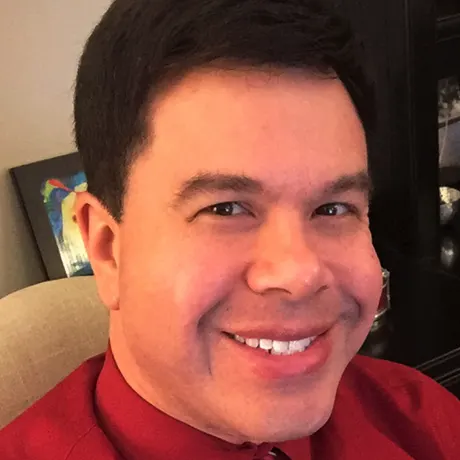
Roberto Olivardia, PhD
is an expert in the treatment of ADHD, obsessive-compulsive disorder, and body dysmorphic disorder. He also focuses on issues facing students with learning disabilities.
Latest episodes

March 22, 2023
Listen to the trailer for Season 2 of “Understood Explains,” which explains ADHD diagnosis in adults — from getting tested to finding support.
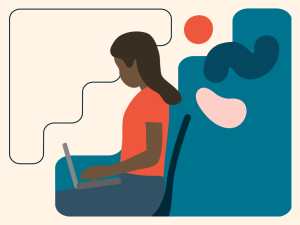
March 29, 2023
Wondering if you have enough ADHD symptoms? If it’s worth the effort to get tested? Host Dr. Roberto Olivardia shares his own adult diagnosis story.

March 29, 2023
Find out which types of health care providers can diagnose ADHD in adults — if it’s worth the wait to see a certain kind of specialist.

March 29, 2023
Find out how doctors test adults for ADHD. What kind of questions do they ask? How long does it take? Know what to expect in a thorough evaluation.
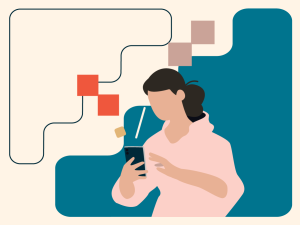
March 29, 2023
The wait time may be shorter, but is online diagnosis accurate? And can it help you get ADHD treatment? Learn the pros and cons of online testing.
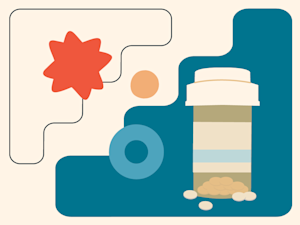
March 29, 2023
How does ADHD medication work? Is it addictive? Get answers to common questions, like how to tell if you’re taking too much or too little.

March 29, 2023
There are many ways to treat ADHD without medication or in addition to medication. Learn about options ranging from behavior therapy to free apps.
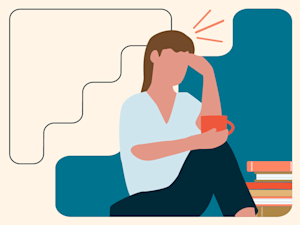
March 29, 2023
Relief. Anger. Grief. Learn about common reactions to getting diagnosed with ADHD and how to process these feelings so you can keep moving forward.
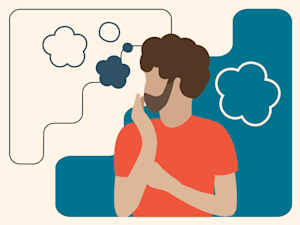
March 29, 2023
Doubting the accuracy of your ADHD diagnosis? Find out how to tell if you got a thorough evaluation and if you might need a second opinion.
